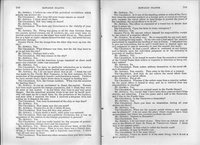788-789
| Previous Page | Next Page |

|
Mr. Jewell. I believe so—one of the periodical revolutions which nobody can account for.
The Chairman. How long did your troops remain on shore?
Mr. Jewell. I think about six days.
The Chairman. Did they camp on shore?
Mr. Jewell. Yes.
The Chairman. Was there any disturbance in the vicinity of your camp?
Mr. Jewell. No. Firing was going on all the time between these two parties, around corners, out of windows, etc., and every time we showed ourselves down on the wharf they would fire at us. They would fire at a light at night—amuse themselves that way; but never did any particular damage.
Senator Frye. But the troops from the other ship went up into the city?
Mr. Jewell. Yes.
The Chairman. What distance was that; how far did they have to go to get into the city?
Mr. Jewell. Perhaps half a mile.
The Chairman. Did they remain in the city?
Mr. Jewell. Yes.
The Chairman. And the American troops remained on shore until peace was restored—order was restored?
Mr. Jewell. Yes.
The Chairman. You have no particular information as to whether either faction of the people there desired your presence?
Mr. Jewell. No, I do not know about that at all. I think the call was made by the Pacific Mail Company, in the first instance, for the protection of the property in transit—merchandise in transit. I believe we have certain treaty rights down there in regard to landing men.
The Chairman. Now, the Corean incident. What was the occasion for landing there?
Mr. Jewell. It was an excitement in Seaul, the capital. Threats had been made against the foreign population, and I think they were all more or less scared. I do not think they were in any very great danger. But the American minister wrote to me that he would probably call upon me for a small force for the protection of the legation, and soon after I received the letter I received a telegram from him asking me to dispatch the men.
The Chairman. You were in command of the ship at that time?
Mr. Jewell. Yes.
The Chairman. How many men did you send?
Mr. Jewell. Twenty-five or 30—I think 30 men.
The Chairman. How long did they stay ashore?
Mr. Jewell. I think about a week; until quiet was restored.
The Chairman. That was not a political revolution, but it was an opposition of the natives to the foreign population in general?
Mr. Jewell. Yes.
The Chairman. And you really landed for the purpose of protecting the American citizens there and the legation?
Mr. Jewell. Yes. There were other men-of-war there at the time and they all landed troops. That is to say, there was a French man-of- war, a Russian man-of-war, and a Japanese man-of-war. I think they all sent men up there.
The Chairman. Was there any other occasion when you have landed troops?
|
Mr. Jewell. No.
The Chairman. IS it one of the standing orders or rules of the Navy that when the minister resident at a foreign port, or consul at a foreign port, requests the naval officer to land troops to protect the peace of the consulate, the naval officer is to do it?
Mr. Jewell. The officer in command of a vessel has to decide that when it comes up.
The Chairman. Upon the facts in every emergency?
Mr. Jewell. Yes.
Senator Frye. He can not relieve himself for responsibility except by the orders of a superior officer?
Mr. Jewell. In no other way. He is responsible for any such landing or landings he may make. In my own case I had asked the admiral particularly in regard to the landing of men in Corea. I had asked him to give me instructions, but he said I would have to depend upon my own judgment in case of necessity, in case the request was made.
The Chairman. So that a naval officer in command at any foreign port is thrown upon his individual judgment as to the necessity or propriety of landing forces?
Mr. Jewell. Yes.
The Chairman. Is he bound to receive from the consuls or ministers of the United States their orders or requests or direction as being military orders?
Mr. Jewell. No.
The Chairman. Their orders address themselves to the naval officer's discretion?
Mr. Jewell. Yes, exactly. They come in the form of a request.
The Chairman. And they do not relieve the naval officer from responsibility as a naval officer.
Mr. Jewell. Not at all.
The Chairman. Whereas if the orders come from a superior authority the naval officer is bound to obey, and he is relieved from any responsibility in obeying?
Mr. Jewell. Yes.
The Chairman. Have you cruised much in the Pacific Ocean?
Mr. Jewell. No; except that I have been three years on that China station; not otherwise. I was two years and a half in the Tuscarora, and I was in the Pacific then.
The Chairman. Is the Tuscarora a steamship?
Mr. Jewell. Yes.
The Chairman. Have you been on steamships during all your cruises out there?
Mr. Jewell. Yes.
The Chairman. What are the nearest points where a coal supply can be obtained? I do not mean the place where supplies have been accumulated, but where the countries produce the coal?
Mr. Jewell. Nearest to Honolulu?
The Chairman. Yes.
Mr. Jewell. I do not know of any. They have an inferior kind of coal in the Straits of Juan de Fuca, at Vancouvers Island. I think that is the nearest point.
The Chairman. Is that what is called the Seattle coal?
Mr. Jewell. It may be Seattle coal.
The Chairman. It is the same thing?
Mr. Jewell. I have no doubt it is the same thing; but it is not a good quality of coal.
| Previous Page | Next Page |